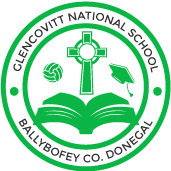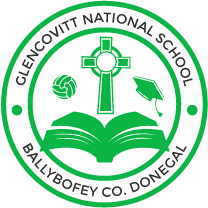General Information
Emergency Closing
If the school must close due to a central heating failure or snow, etc, a text message from the school will be sent to your mobile phone. The other situation that might arise is that the emergency may only be discovered by teachers when they enter the school. Should this happen you will be informed at the school gates. If children arrive alone they will be supervised until such time as a parent/guardian can collect them.
Green Schools
We are a Green Flag School and are continuing with our Environmental Projects.
Traffic
Parents are asked not to park in front of the school’s gates as this is a pedestrian exit and is clearly marked by a yellow box.
Lost Property
Please mark all your child’s possessions with their name so that school staff can return any lost and found items promptly.
Educational Assessment and Learning Support
Glencovitt N.S. is supported by an Educational Psychologist. If we have serious concerns about a child’s behavior or educational progress we may contact the psychologist for advice. This is always done with parental permission. Some children may need to be assessed by the psychologist. Again parents are fully informed and permission is sought from parents before this takes place. The school also has a Learning Support Teacher who will assist children who are having difficulty in English and Mathematics. Should your child need extra help you will be consulted and your permission sought before the process begins.
The Staff of Glencovitt N.S. comprises of:
Mrs Martina Mallon – Principal
Ms. Gráinne Houston – Deputy Principal
Mrs Kathleen Kelly-McIntyre
Ms. Angela Melaugh
Glencovitt National School has a full time Special Needs Assistant Ms. Susan Stewart and a part time secretary, Ms. Geraldine McGuinness who works from Monday to Friday 08.50 a.m. – 12 noon. We have one part time cleaner Mrs Pauline Lynch.
The school has a Roman Catholic Ethos and is under the patronage of the Bishop of Derry, Bishop Donal McKeown. The school is governed by a Board of Management, which was formed in 2011.
Board of Management 2023-2027
Chairperson: Mrs. Georgina O’Brien
Patron’s Representative: Fr. P. Arkinson
Parent Representatives: Mr. Jon Gilbert and Mrs. Elaine Dooley
Teacher Representative: Mrs. Martina Mallon, Mrs. Angela Melaugh
Community Representatives: Mr. Tony Gillespie, Mrs. Mena McHugh
Click here to view the Junior Cycle Information for Parents PDF
Support for Parents
The National Adult Literacy Agency (NALA) offers help and advice for parents who have difficulty reading, writing, spelling or doing math. They have a Freephone number parents can call 1800 20 20 65 or a website www.takethefirststep.ie – parents can learn with their local ETB Adult Education Service or over the phone and online through NALA’s Distance Learning Service. All services are free.
1. PHYSICAL EDUCATION, WHOLE SCHOOL PLANNING
Physical education/S.P.H.E. whole school planning and timetable will be implemented in these subject areas so each strand is completed in a systematic and cyclical fashion. This was trialled successfully between Jan. ’19 and June ’19 and will be implemented again for the school year 2019 – 2020.
3.Review of Critical Incident Policy
This policy has been reviewed and was ratified by the Board of Management in May 2019. Staff have discussed the Policy. Each staff member has received a copy of the policy and knows what role(s) has been assigned to them. “Ready to go” packs have been prepared for families and teachers in the event of a critical incident.




